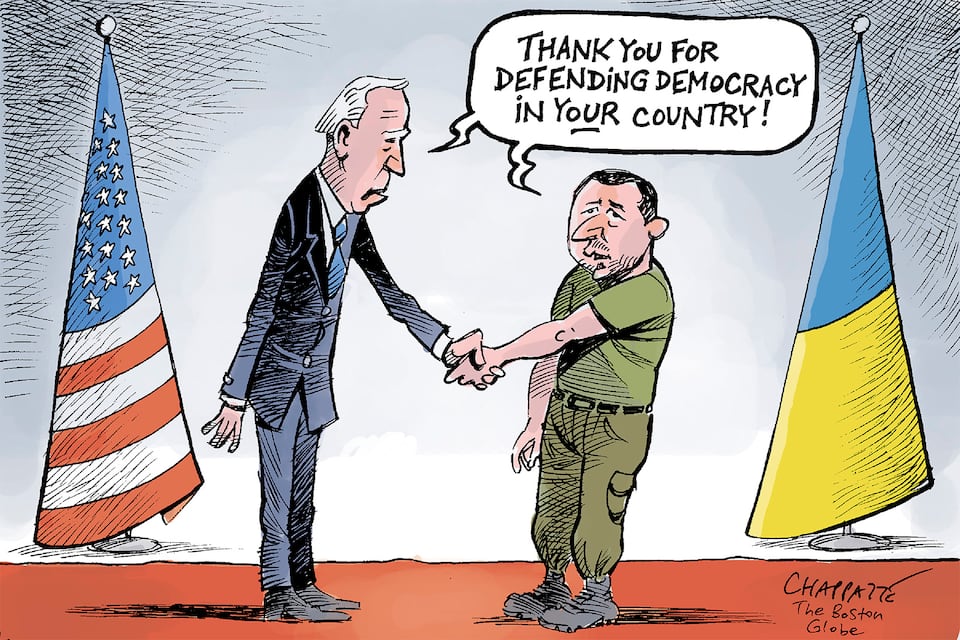Ukraine And NATO: Trump's Assessment And Its Geopolitical Ramifications

Table of Contents
Trump's Ambivalence Towards NATO Membership for Ukraine
Trump's position on Ukraine's NATO aspirations was characterized by significant ambivalence, a stance that had far-reaching consequences. This stemmed from two key aspects of his foreign policy: his criticism of NATO burden-sharing and his doubts about Ukraine's readiness for membership.
Criticism of NATO Burden-Sharing
Trump frequently criticized NATO allies, particularly European nations, for what he perceived as insufficient financial contributions and a lack of commitment to collective defense. His rhetoric often questioned the value of NATO itself.
- Examples: Trump repeatedly threatened to withdraw the US from NATO, demanding that other members significantly increase their defense spending. He prioritized bilateral deals over multilateral commitments, undermining the alliance's core principle of collective security.
- Impact on Ukraine: This skepticism towards NATO weakened the alliance's overall credibility and arguably diminished the prospects of Ukraine's eventual membership. The uncertainty created by Trump's pronouncements left Ukraine vulnerable and cast doubt on the West's collective commitment to its security.
Doubt Towards Ukraine's Readiness
Beyond questioning NATO's value, Trump also expressed doubts about Ukraine's preparedness to join the alliance. This was often linked to concerns about corruption within the Ukrainian government and the ongoing conflict in the Donbas region.
- Examples: Trump's administration occasionally voiced concerns about Ukraine's internal reforms and its ability to meet NATO's military standards. These concerns, while sometimes valid, were often presented in a way that minimized the external aggression Ukraine faced from Russia.
- Impact on Ukraine: Such statements, regardless of their validity, undermined Ukrainian morale and potentially discouraged international support for its NATO ambitions. The perception of a lack of US commitment fuelled uncertainty and hindered Ukraine's efforts to strengthen its position on the world stage.
The Impact on US-Ukraine Relations
Trump's presidency witnessed a fluctuating level of US support for Ukraine, marked by both cooperation and controversy. This fluctuating support had a significant impact on the bilateral relationship and Ukraine's ability to withstand Russian aggression.
Shifting Support and Aid
While the US continued to provide military assistance and financial aid to Ukraine during Trump's tenure, the level of support and the overall messaging often seemed inconsistent.
- Examples: Aid packages were approved, but their size and scope sometimes fell short of expectations. Public statements from the administration were occasionally ambiguous, creating uncertainty about the long-term commitment of the US to Ukraine's sovereignty.
- Implications: This fluctuating support impacted Ukraine's ability to effectively defend itself against Russian aggression. The lack of clear and consistent messaging from the US administration arguably emboldened Russia and created doubts about the reliability of American support among Ukraine's allies.
The Controversial Phone Call and Impeachment Inquiry
The infamous July 2019 phone call between Trump and Ukrainian President Volodymyr Zelensky, where Trump allegedly pressured Zelensky to investigate his political rival Joe Biden, had devastating consequences for the US-Ukraine relationship.
- Key Details: The call led to a whistleblower complaint, a House impeachment inquiry, and a Senate trial. The controversy exposed potential vulnerabilities in the US-Ukraine relationship and cast a shadow over the already complicated geopolitical landscape.
- Effects on International Perception: The controversy severely damaged the international perception of the US commitment to Ukraine and weakened trust in American leadership. It highlighted potential conflicts of interest within the US administration and raised questions about the integrity of US foreign policy.
Geopolitical Consequences of Trump's Approach
Trump's ambiguous stance towards NATO and Ukraine had significant geopolitical ramifications, impacting regional stability, the transatlantic alliance, and the balance of power in Eastern Europe.
Emboldened Russia
Trump's approach, characterized by uncertainty and a seeming reluctance to confront Russia directly, arguably emboldened the Kremlin.
- Examples: Russia's annexation of Crimea in 2014 and its continued aggression in the Donbas region occurred before and during Trump's presidency. Some analysts argue that Trump's rhetoric and actions, such as questioning the value of NATO, may have encouraged further Russian assertiveness.
- Impact on Regional Stability: This emboldened Russia destabilized the region and threatened the security of Ukraine and its neighbors. The lack of a strong, unified Western response further fueled Russian expansionist ambitions.
Weakened Transatlantic Alliance
Trump's actions significantly strained relationships with key European allies, undermining the unity and effectiveness of the transatlantic alliance.
- Examples: Trump's frequent criticism of European NATO members for their spending levels and his questioning of the alliance's relevance created divisions within the alliance and hampered its collective defense capabilities.
- Long-term Implications: This weakened transatlantic alliance has long-term implications for NATO's ability to respond to threats, not only in Eastern Europe but globally. The erosion of trust between the US and its European allies created vulnerabilities that Russia and other adversaries could exploit.
Conclusion
Trump's approach to Ukraine and NATO had profound and multifaceted ramifications. His ambivalence towards NATO membership for Ukraine, coupled with fluctuating US support and the controversy surrounding the phone call with President Zelensky, created uncertainty and arguably emboldened Russia. This undermined the transatlantic alliance and created lasting challenges for Ukraine's security. Understanding the complexities of "Ukraine NATO Trump" is crucial for navigating the ongoing geopolitical challenges in Eastern Europe and for assessing the enduring impact of Trump's foreign policy decisions. Further research and analysis are needed to fully comprehend the long-term consequences of this turbulent period in international relations. Learn more about the enduring impact of Trump's policies by exploring the ongoing discussions surrounding "Ukraine NATO Trump" and its impact on global security.

Featured Posts
-
 Zuckerbergs Meta And The Trump Administration Impacts And Challenges
Apr 26, 2025
Zuckerbergs Meta And The Trump Administration Impacts And Challenges
Apr 26, 2025 -
 Coachella 2024 Brian May Joins Benson Boone On Stage
Apr 26, 2025
Coachella 2024 Brian May Joins Benson Boone On Stage
Apr 26, 2025 -
 Ftc Probe Into Open Ai A Deep Dive Into Chat Gpts Future
Apr 26, 2025
Ftc Probe Into Open Ai A Deep Dive Into Chat Gpts Future
Apr 26, 2025 -
 A Conversation With Microsofts Design Chief The Future Of Ai And Human Interaction
Apr 26, 2025
A Conversation With Microsofts Design Chief The Future Of Ai And Human Interaction
Apr 26, 2025 -
 Human Centered Ai Design An Interview With Microsofts Chief Designer
Apr 26, 2025
Human Centered Ai Design An Interview With Microsofts Chief Designer
Apr 26, 2025
